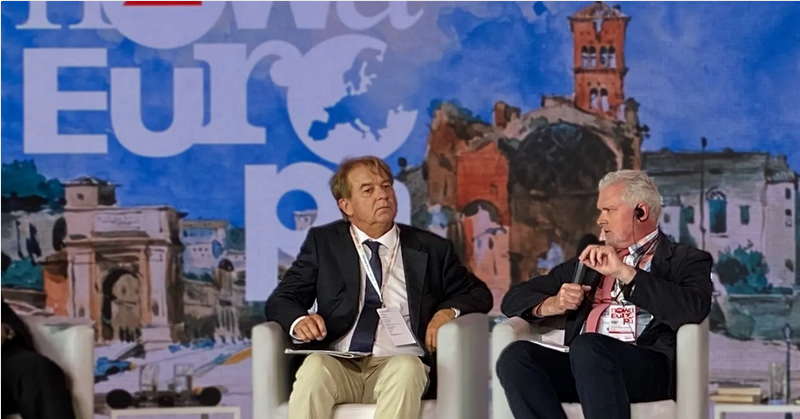Original Article: “In Love with Poland” Warsaw Magazine ‘Let’s Go’ Covers Benedictine’s Tory Baucum
Dr. Tory Baucum, the Director of Benedictine College’s Center for Family Life, was recently featured in an article in Let’s Go Magazine out of Warsaw, Poland. The story covers Dr. Baucum’s inspiration to full communion with the Catholic Church through the work of St. John Paul II, his part in Poland’s Great Project Congress, and his thoughts on the Polish heroism in taking in so many refugees during the Ukrainian-Russian conflict. See the original here.
The world should learn about Poland’s history, says Tory Baucum, a university lecturer from the USA, youth educator and member of the Copernican Academy.
He came to Poland with students from Benedictine College in Atchison, Kansas, to show them our country, especially the places associated with St John Paul II. As director of the Center for Family Life at the college, Baucum promotes a theology of the body according to the Polish Pope. However, the American’s plans go further – he is in talks with one of the schools in southern Poland, so that students from the USA can come to our country for a year or a semester and have the chance to learn about the context of the saint pope’s life and the culture that shaped him.
Baucum’s fascination with John Paul II was one of the important reasons for his interest in Poland and our history. He, himself, was a well-known Anglican pastor. He converted to Catholicism a few years ago. “My only regret is that it took so long. It is an answer to the call to love,” he says briefly. Today he is a lay person and a Benedictine oblate. It is worth noting that he still maintains good relations with many Anglicans.
Why do it?
Baucum has visited Poland several times since the Russian invasion of Ukraine. As he says himself, there is no rational explanation why he is interested in our country. “I fell in love with Poland. And there are many things that intrigue me about Polish history,” he says.
He had the opportunity to observe the provision of support to Ukrainians, especially in the first months of the war. “I asked a man named Slawomir, who helped many refugees, why he was doing it, why he was saving someone’s life,” the American recalls. “He could only answer, “I just had to.”” This made him reflect on where such an attitude comes from and his conviction that this is the right thing to do.
Together with his friend Rabbi Marc Gopin, Baucum took part in Poland’s Great Project Congress last year in Warsaw. Gopin, director of the Center for World Religions, Diplomacy and Conflict Resolution, was also impressed by the support for Ukrainians and the fact that there are no refugee camps in Poland. “Thirty years I’ve been dealing with this, and I’ve never seen anything like this,” the rabbi noted.
According to Tory Baucum, such a spontaneous reaction of Poles has its source in our history, in the identity of the nation. This was the subject of his lecture in Toruń in February this year, when he became a member of a newly established institution, the Copernican Academy. “One issue that intrigues me is the history of religious freedom in Poland. Although in many people’s minds the history of the 20th century has disproved this, the reason there were so many Jews here is because it was a peaceful place. They were able to live here in peace for hundreds of years,” he stresses. Baucum is also fascinated by the fact that the nation survived despite such a long period of partition.
Catholicism is freedom.
Baucum emphasizes the role of faith in the history of our homeland. “The Polish-Lithuanian Commonwealth was an early example of multinationalism, a multicultural experiment. But the basis was a Catholic culture that promoted religious freedom and multiculturalism. This completely shatters certain categories of thought – what is liberal, progressive and what is traditional. It is faith that causes openness, generosity and hospitality. Poles have understood this and it needs to be talked about. I am trying to do it myself,” says Baucum.
In his opinion, the world’s biggest media should come to Poland and prepare reports, features and texts. Baucum recalls his conversation with the Minister of Culture Piotr Gliński. “I said to him: Do you know what the main problem is? Poland’s bad PR. And he agreed with me. You have the best story to tell, and the world doesn’t know about it,” says the American.
Baucum says that a healthy, critical approach to one’s own history is needed, but not to excess. It is also necessary to appreciate the positive and be happy about it. On the issue of Polish-Ukrainian relations, Baucum is aware that there have been many conflicts in history.
The American also wondered how Poles hosting Ukrainians could be supported. While in Poland, with the permission of the bishop of his diocese, he met with Bishop Michał Janocha. Baucum’s idea is that through cooperation between parishes in Poland and the USA, Americans would support Catholic families hosting refugees in Poland.
Beginning with his fascination with John Paul II and then through his interest in Poland and our history, Baucum began to build a network of relationships between people and institutions from our country and the USA. He became a friend and informal ambassador of Poland.
Story by Barbara Stefańska
